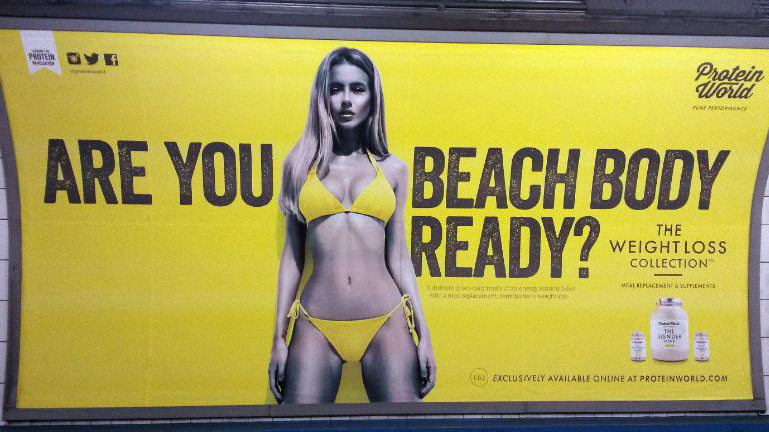‘Negative gender stereotypes’ to be banned from UK adverts
Advertising Standards Authority says sexist depictions ‘can restrict opportunities’ and inflict economic harm

A free daily email with the biggest news stories of the day – and the best features from TheWeek.com
You are now subscribed
Your newsletter sign-up was successful
Advertisements featuring gender stereotypes that are “likely to cause harm, or serious or widespread offence” are to be banned in Britain from June next year, the country’s advertising watchdog has announced.
The new regulations are aimed at depictions of men and women apparently struggling to perform a task because of their sex, “such as a man unable to change a nappy or a woman unable to do DIY”, The Guardian reports.
The rules will cover adverts in newspapers, magazines, on television, in cinema, on leaflets and on the internet, the newspaper adds.
The Week
Escape your echo chamber. Get the facts behind the news, plus analysis from multiple perspectives.

Sign up for The Week's Free Newsletters
From our morning news briefing to a weekly Good News Newsletter, get the best of The Week delivered directly to your inbox.
From our morning news briefing to a weekly Good News Newsletter, get the best of The Week delivered directly to your inbox.
The crackdown is the result of a recent review of gender stereotyping in commercials by the Advertising Standards Authority (ASA) and sister organisation the Committee of Advertising Practice (CAP). The study found that “harmful stereotypes can restrict the choices, aspirations and opportunities of children, young people and adults”, and that these stereotypes can be “reinforced by some advertising, which plays a part in unequal gender outcomes”.
ASA spokesman Craig Jones told CNN that such stereotyping had resulted in “solid” examples of economic harm, such as staff shortages in certain industries.
“People who represent engineers in this country said to us they believe one of the factors contributing to a labour shortage... is too few women are going into it,” he said. “They think the role of advertising presenting engineering as a male role is partly to blame.”
The ASA is “aware that it is likely to face criticism over the new rules from people who feel they are too politically correct”, says The Guardian.
A free daily email with the biggest news stories of the day – and the best features from TheWeek.com
But Ella Smillie, the lead on CAP’s gender stereotyping project, insists that the regulations are simply “reflecting the changing standards in society”. She continued: “Changing ad regulation isn’t going to end gender inequality but we know advertising can reinforce harmful gender stereotypes, which can limit people’s choices or potential in life.”
Warning that advertisers could no longer use comedy as a defence, she added: “Tired old tropes don’t really work with consumers any more. The use of humour or banter is unlikely to mitigate against the potential for harm.
“It’s fine to show people undertaking gender-stereotypical roles such a woman cleaning. But if an advert showed a woman being solely responsible for cleaning up mess within a home while a man sits around with his feet up then that would be a problem.”
Meanwhile, a statement on the ASA website emphasises that the aim is not to prevent ads from featuring “glamorous, attractive, successful, aspirational or healthy people or lifestyles”, nor the use of “gender stereotypes as a means to challenge their negative effects”.
-
 5 cinematic cartoons about Bezos betting big on 'Melania'
5 cinematic cartoons about Bezos betting big on 'Melania'Cartoons Artists take on a girlboss, a fetching newspaper, and more
-
 The fall of the generals: China’s military purge
The fall of the generals: China’s military purgeIn the Spotlight Xi Jinping’s extraordinary removal of senior general proves that no-one is safe from anti-corruption drive that has investigated millions
-
 Why the Gorton and Denton by-election is a ‘Frankenstein’s monster’
Why the Gorton and Denton by-election is a ‘Frankenstein’s monster’Talking Point Reform and the Greens have the Labour seat in their sights, but the constituency’s complex demographics make messaging tricky
-
 Sport on TV guide: Christmas 2022 and New Year listings
Sport on TV guide: Christmas 2022 and New Year listingsSpeed Read Enjoy a feast of sporting action with football, darts, rugby union, racing, NFL and NBA
-
 House of the Dragon: what to expect from the Game of Thrones prequel
House of the Dragon: what to expect from the Game of Thrones prequelSpeed Read Ten-part series, set 200 years before GoT, will show the incestuous decline of Targaryen
-
 One in 20 young Americans identify as trans or non-binary
One in 20 young Americans identify as trans or non-binarySpeed Read New research suggests that 44% of US adults know someone who is transgender
-
 The Turner Prize 2022: a ‘vintage’ shortlist?
The Turner Prize 2022: a ‘vintage’ shortlist?Speed Read All four artists look towards ‘growth, revival and reinvention’ in their work
-
 What’s on TV this Christmas? The best holiday television
What’s on TV this Christmas? The best holiday televisionSpeed Read From films and documentaries to musicals for all the family
-
 Coco vision: up close to Chanel opticals
Coco vision: up close to Chanel opticalsSpeed Read Parisian luxury house adds opticals to digital offering
-
 Abba returns: how the Swedish supergroup and their ‘Abba-tars’ are taking a chance on a reunion
Abba returns: how the Swedish supergroup and their ‘Abba-tars’ are taking a chance on a reunionSpeed Read From next May, digital avatars of the foursome will be performing concerts in east London
-
 ‘Turning down her smut setting’: how Nigella Lawson is cleaning up her recipes
‘Turning down her smut setting’: how Nigella Lawson is cleaning up her recipesSpeed Read Last week, the TV cook announced she was axing the word ‘slut’ from her recipe for Slut Red Raspberries in Chardonnay Jelly